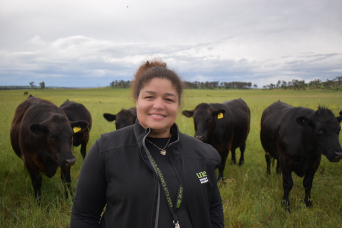Dr Amelia de Almeida
Research Fellow - School of Environmental and Rural Science

Email: Amelia.deAlmeida@une.edu.au
Biography
Amelia is an animal scientist with a PhD (2013) in ruminant nutrition and experience in scientific methods applied to several domestic ruminant species (i.e. beef cattle, dairy cattle, sheep and goats). The academic positions she held from 2014 to 2019 were focused on generating models to predict and describe dry matter intake, growth and nutritional requirements in ruminants using meta-analytical approaches, and unfolding the transgenerational effects of heat stress in dairy cattle. Throughout these research positions Amelia has actively involved in hands-on research trials and sought out opportunities to grow her capability in curriculum and assessment design, unit coordination, face-to-face and online teaching, design and teaching of practicals, problem-based tutorials and marking. In recent years. During her tenure in Australia, Amelia has been project leader of research focussed on the intersection of animal physiology and climate science and investigating effective methods to reduce the methane emissions from ruminant livestock.
Her current research is aligned with the goals of the AUD$ 29-billion Australian red meat industry to be Carbon Neutral by 2030 (CN30). She has published in high-ranked journals in her field. She is an Associate Editor of Animal Nutrition (Elsevier Journal ranked the higher impact factor Journal in Agriculture, Dairy and Animal Sciences), and the youngest Associate editor of Small ruminant research, responsible for the overall quality of the intellectual content of this important international journal and for overseeing the review process.
Amélia has published more than 35 peer-review articles, a commendable feat that few achieve at a similar academic stage. According to a recent review of Google Scholar, Amélia has received 336 citations from other researchers in his field and has an h-index of 11 and an i10-index of 14, which means that, on average, each of his publications is cited 14 times in the last ten years. According to the Research Gate portal, Amélia has 287 citations and an RG score of 25.5, comprising the top 5% of researchers registered worldwide.

